Top Rankings
Waynesville R-VI School District ranks among the top 20% of public school district in Missouri for:
Category
Attribute
Reading/Language Arts Proficiency
Highest reading/language arts proficiency (Top 20%)
Diversity
Most diverse schools (Top 1%)
Community Size
Largest student body (number of students) (Top 1%)
For the 2025 school year, there are 2 public preschools serving 312 students in Waynesville R-VI School District.
Public Preschools in Waynesville R-VI School District have a diversity score of 0.64, which is more than the Missouri public preschool average of 0.54.
Minority enrollment is 45% of the student body (majority Hispanic), which is more than the Missouri public preschool average of 36% (majority Black).
Overview
This School District
This State (MO)
# Schools
11 Schools
733 Schools
# Students
6,091 Students
201,896 Students
# Teachers
407 Teachers
18,018 Teachers
Student : Teacher Ratio
16:1
16:1
District Rank
Waynesville R-VI School District, which is ranked within the top 30% of all 553 school districts in Missouri (based off of combined math and reading proficiency testing data) for the 2021-2022 school year.
The school district's graduation rate of 89% has decreased from 91% over five school years.
Overall District Rank
#127 out of 557 school districts
(Top 30%)
(Top 30%)
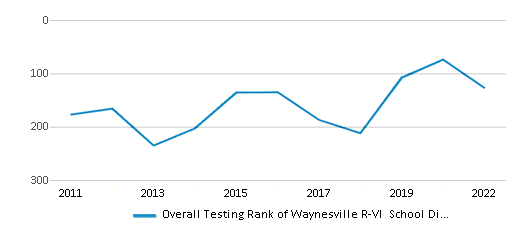
Math Test Scores (% Proficient)
43%
39%
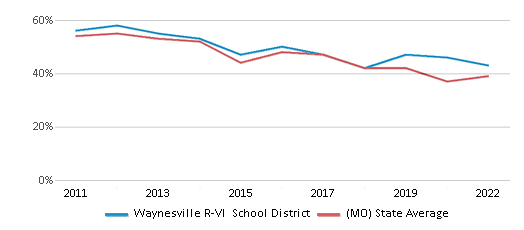
Reading/Language Arts Test Scores (% Proficient)
50%
43%
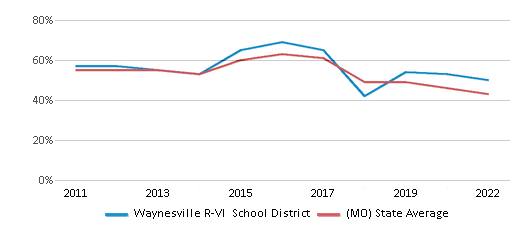
Science Test Scores (% Proficient)
39%
38%
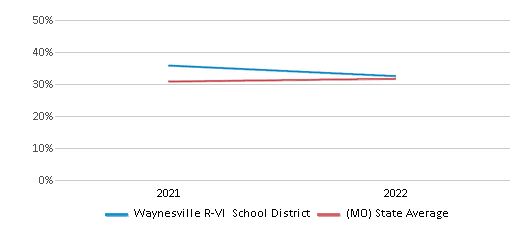
Graduation Rate
89%
90%
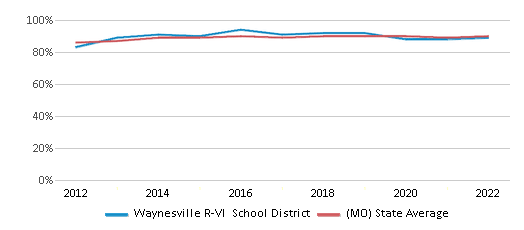
Students by Ethnicity:
Diversity Score
0.62
0.54
# American Indian Students
37 Students
716 Students
% American Indian Students
1%
n/a
# Asian Students
121 Students
3,353 Students
% Asian Students
2%
2%
# Hispanic Students
989 Students
17,293 Students
% Hispanic Students
16%
9%
# Black Students
668 Students
39,639 Students
% Black Students
11%
20%
# White Students
3,557 Students
129,832 Students
% White Students
58%
64%
# Hawaiian Students
139 Students
837 Students
% Hawaiian Students
2%
n/a
# Two or more races Students
580 Students
10,226 Students
% of Two or more races Students
10%
5%
Students by Grade:
# Students in PK Grade:
312
35,559
# Students in K Grade:
425
31,533
# Students in 1st Grade:
443
29,607
# Students in 2nd Grade:
487
29,116
# Students in 3rd Grade:
478
23,532
# Students in 4th Grade:
451
22,982
# Students in 5th Grade:
458
19,323
# Students in 6th Grade:
441
6,065
# Students in 7th Grade:
456
1,923
# Students in 8th Grade:
447
1,863
# Students in 9th Grade:
438
85
# Students in 10th Grade:
449
51
# Students in 11th Grade:
426
37
# Students in 12th Grade:
380
220
# Ungraded Students:
-
-
District Revenue and Spending
The revenue/student of $12,634 in this school district is less than the state median of $15,081. The school district revenue/student has stayed relatively flat over four school years.
The school district's spending/student of $13,311 is less than the state median of $13,908. The school district spending/student has stayed relatively flat over four school years.
Total Revenue
$77 MM
$13,447 MM
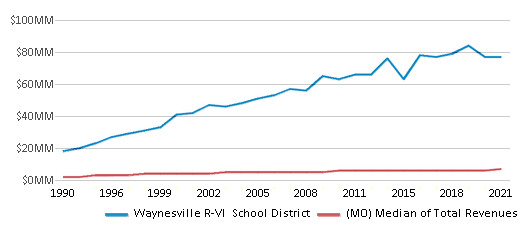
Spending
$81 MM
$12,401 MM
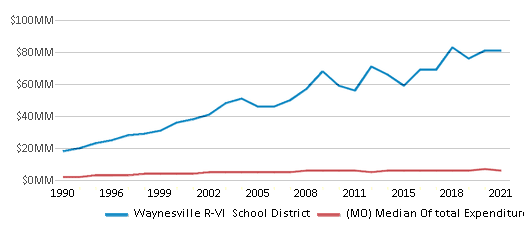
Revenue / Student
$12,634
$15,081
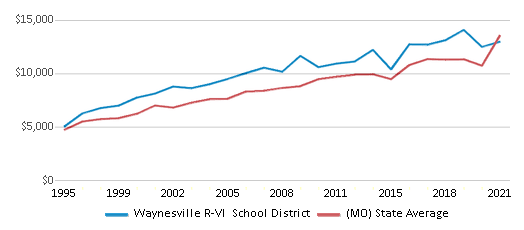
Spending / Student
$13,311
$13,908
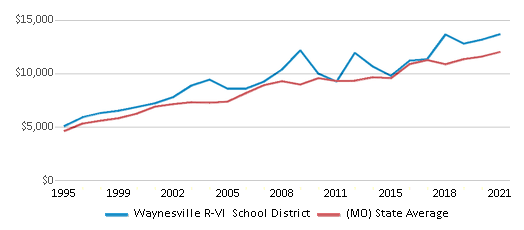
Best Waynesville R-VI School District Public Preschools (2025)
School
(Math and Reading Proficiency)
(Math and Reading Proficiency)
Location
Grades
Students
Rank: n/an/a
909 Us Rte. 66 W
Waynesville, MO 65583
(573) 842-2350
Waynesville, MO 65583
(573) 842-2350
Grades: PK
| 42 students
Rank: n/an/a
12225 Pulaski Avenue
Fort Leonard Wood, MO 65473
(573) 842-2650
Fort Leonard Wood, MO 65473
(573) 842-2650
Grades: PK
| 270 students
Recent Articles

What Is A Charter School?
Explore the world of charter schools in this comprehensive guide. Learn about their history, how they operate, and the pros and cons of this educational innovation. Discover key facts about charter schools, including admission policies, demographics, and funding, as well as what to look for when considering a charter school for your child.

10 Reasons Why High School Sports Benefit Students
Discover the 10 compelling reasons why high school sports are beneficial for students. This comprehensive article explores how athletics enhance academic performance, foster personal growth, and develop crucial life skills. From improved fitness and time management to leadership development and community representation, learn why participating in high school sports can be a game-changer for students' overall success and well-being.

February 05, 2025
Understanding the U.S. Department of Education: Structure, Impact, and EvolutionWe explore how the Department of Education shapes American education, from its cabinet-level leadership to its impact on millions of students, written for general audiences seeking clarity on this vital institution.





